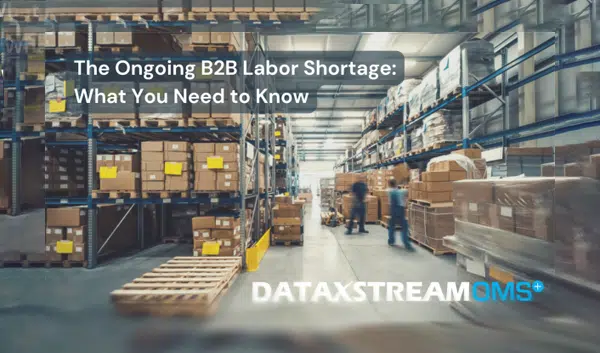B2B companies today are facing labor shortages that can be felt all along the supply chain, particularly for businesses in the wholesale distribution space.
With widespread implications across the economy, let’s take a look at the current state of the labor shortage in wholesale distribution and what companies can do to combat these challenges and retain their competitive edge in the markets.
Current Labor Market Challenges
Many industries continue to struggle with staffing challenges years after the peak fallout from the COVID-19 pandemic.
In a recent report done by the U.S. Chamber of Commerce, it was shown that over 50 million Americans left their positions in 2022, something that is now being referred to as ‘The Great Resignation’.
While many different sectors have felt the impact of this movement, wholesale distribution in particular has been largely affected. Even before the pandemic, this sector faced a number of roadblocks, including a shortage of skilled workers in the employment pool, a growing pressure to raise wages, and long employee onboarding processes that deter new hires.
In addition, a major setback for the industry has been the generational gap among employees. There is currently a large percentage of the workforce in this industry that is set to retire, and there aren’t enough younger employees that are attracted to working in the distribution space. Plus, with so many businesses in the space using older and legacy technology, the industry as a whole isn’t attractive to up-and-coming talent.
Thus, as the competition for attracting workers like truck drivers, warehouse employees, sales, and customer support staff remains stiff, distributors will continue to deal with staffing challenges that could negatively impact their productivity and profitability levels. In this article, we would like to focus specifically on the sales function of distributors.
Helpful Solutions & Strategies for Wholesale Distributors
Despite the ongoing challenges in the labor market, there are a few approaches that wholesale distributors can take to retain their profitability and competitive edge, while still offering a quality solution to customers.
Offer Training & Development Opportunities
The skills gap plaguing the industry is something that any company in the field has dealt with. One way to address this issue is to provide training and development opportunities for existing sales and customer service staff.
This can help companies take advantage of the employees they do have without having to focus on increasing their recruitment efforts or looking for talent outside of the company–both of which are very costly tasks.
With this, internal staff can develop the specialized skills they need to succeed in more complex or technical roles.
Improve Employee Experience Engagement
Another way to insulate wholesale distributors from the disruptions caused by the ongoing labor shortage is to focus on improving the employee experience, which can boost employee retention.
This can be done in a number of ways, including employee recognition programs, better working environments, enhanced benefits, and more.
Many wholesale distributors still rely on very old, legacy systems that are historically cumbersome and not intuitive to use. Employees must navigate through many screens to retrieve customer order info–which must be done repeatedly throughout their workday, a frustrating process that can lead to high employee turnover.
Plus, when customer service reps are busy trying to work with these old systems, they often lack the time to spend with their customers. Fortunately, many of these repetitive tasks can now be automated in the background using simple automation and AI technologies.
Focusing on updating these outdated systems can improve employee satisfaction on the job, and support better retention. With less employee turnover, wholesale distributors can focus their resources and efforts elsewhere within the business, and less heavily on the recruitment of new employees.
Leverage Technology-Based Solutions
Wholesale distributors can turn towards technology-based solutions and strategies as a way to streamline their operations and overcome these labor market roadblocks–all while supporting profitability.
In particular, one way to do this is through the use of AI and machine learning technologies that reduce wholesale distributors’ reliance on manual labor.
Leveraging these emerging technologies allows companies to automate many of the repetitive tasks that have typically been completed manually. Such manual processes are not only boring and frustrating for employees to complete, but they also require more time and resources.
In turn, these automated processes make it possible to respond to customer requests more quickly and remove the potential for human error, all while making the company less impacted by a tight labor market.
Overcome Employment Challenges with OMS+ by DataXstream
Wholesale distributors don’t have to come up with solutions to these ongoing employment challenges all on their own–they can leverage the power of OMS+ by DataXstream.
By implementing OMS+, organizations are able to reduce their employee training time by 30-90%–condensing the onboarding period from months to a matter of days. Plus, our system helps you decrease the turnaround time on quotes by 95%, so a process that typically takes 12 hours now takes just 20 minutes.
All in all, by eliminating tedious, repetitive tasks, organizations can improve their order accuracy and reduce order rework by 50-90%!
Request a demo with DataXstream today to try out our revolutionary solution that’s driving sales growth for our customers.

